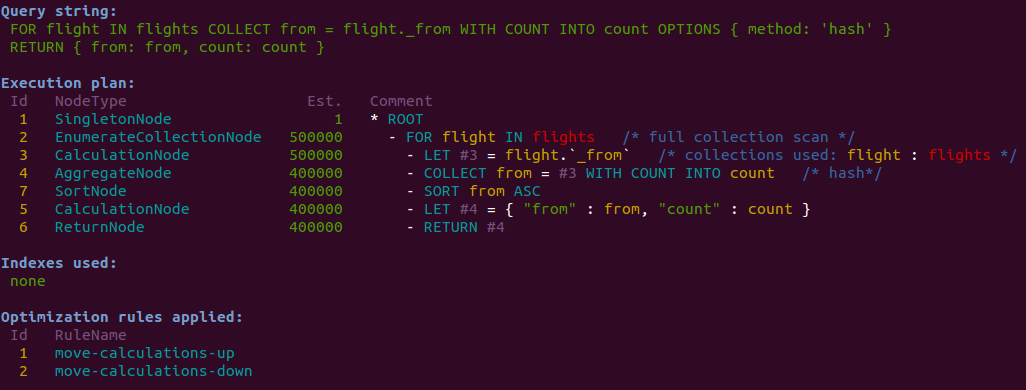

OrientDB Comparison I can't say anything substantive myself as I have no hands on experience with eit. Since then, quite a few things have happened. The next elements are radio elements and sort the displayed results. However, this still leaves the SORT node with the two remaining criteria and the query therefore produces a result that is not sorted correctly.Ĭreate an index that covers all fields used for sorting. Answer: Seems like this question has been asked in other venues: Stackoverflow: MongoDB + Neo4J vs OrientDB vs ArangoDB vsChart: ArangoDB vs. It has been a few months since we first released the Kubernetes operator for ArangoDB and started to brag about it.
 FOR u IN
FOR u IN The default is false and will return the attribute names in any order. Getting Started with ArangoDB: Brief introduction of ArangoDB. The query optimizer recognizes correctly that the filter and the first sorting criterion are covered by the index on, so it removes them. sort (bool, optional): optionally sort the resulting array alphabetically. By default, no specific sort order is maintained for data in a collection. FOR t IN collection LET att REMOVEVALUES(SLICE(ATTRIBUTES(t, true, true), 0, 25), att) LIMIT offset, count RETURN KEEP(t, att) Tried executing the following AQL on ArangoDB 2.8.2 and doesnt seem to be performing a sort on the pr. We also need a mechanism for keeping highscores sorted. Collections are a general-purpose storage mechanism and they are not limited to storing just scores. RETURN KEEP(a, "_key", "name", "order", "datetime")ġ2 IndexNode 589 - FOR a IN activities /* reverse skiplist index scan */Ħ CalculationNode 589 - LET #5 = a.`order` /* attribute expression */ /* collections used: a : activities */ħ CalculationNode 589 - LET #7 = a.`_key` /* attribute expression */ /* collections used: a : activities */ġ0 CalculationNode 10 - LET #9 = KEEP(a, "_key", "name", "order", "datetime") /* simple expression */ /* collections used: a : activities */īy Type Collection Unique Sparse Selectivity Fields Rangesġ2 skiplist activities false false 37.29 % (a.`user_id` = "31132147") ArangoDB is a multi-model NoSQL database with a flexible data model for documents, graphs, and key-values collections. Instead, data in ArangoDB are stored in collections.

SORT a.datetime DESC, a.order DESC, a._key DESC Query String (178 chars, cacheable: true):


 0 kommentar(er)
0 kommentar(er)
